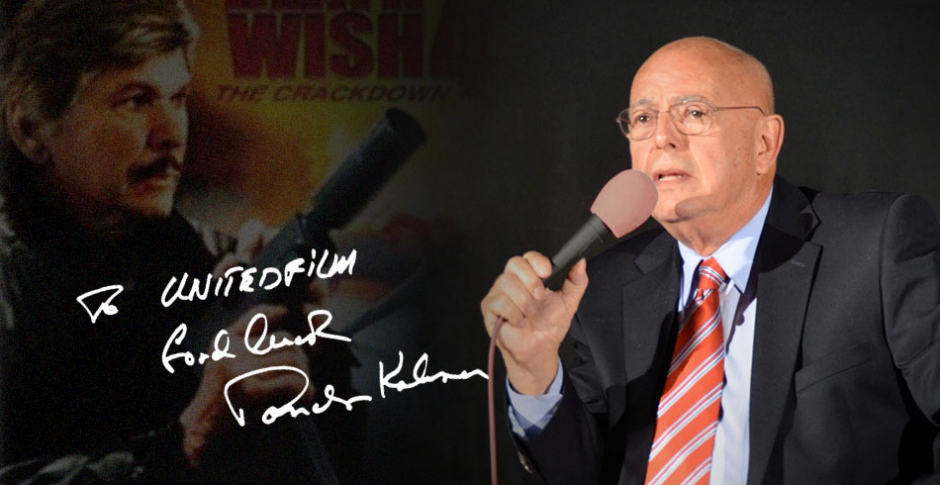Pancho Kohner: Film producing is not an easy job
Written by Eva Csölleová, Vítek FormánekKohner is household surname in Hollywood since early 40´s. At that time a Jew born in Czech town Teplitz named Paul Kohner came here with his wife, Mexican actress called Lupita Tovar - He established an agency and his clients were the likes of writer Bob Traven, directors Billy Wilder, John Huston or Ingmar Bergman. Long after his death his agency still exists and works in LA. His son Pancho Kohner was born on 7.1.1939 and he followed the tire treads of his father.He set up production company Capricorn Production, writes screenplays, produces films and also directed some.Beside that he looks after his mother who is 104 at the time of writing this. He is very friendly and honest man so he agreed on interview with us.
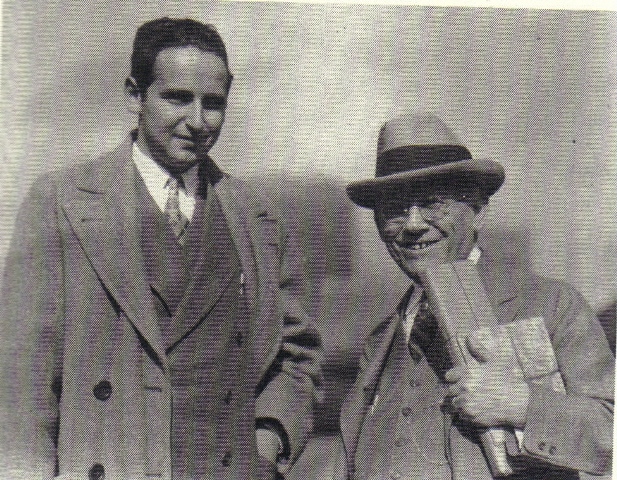
How one becomes a producer? Does it have to be a rich man or it can be anybody who takes a bank loan? Is there any strict amount since when one can call himself a producer?
To become a producer in America you don´t have to have own money.Film is so much expensive that producer must find finance by bank loan.Producer must find good material for good story, must work with author of the story, must find good director and known actors. Once he has all these things altogether it should be clear to financier that the film will be a box office hit and loan will be returned.But that isn´t always a case.Producer can work on film development for many years and still doesn´t have to find the budget for that.My latest film called Victoria lasted 40 years before it got back to the screen again.Between all that producer must also eat and pay bills so it is better when he has his daily job.Producer as such, if clever enough, won´t invest his own savings into the film, he will use other people´s money.Once he gets a go ahead with money he must hire the crew, actors and looks to get the best possible film from the money he has.It sometimes means to film in different countries where it costs less so we film in Canada instead of New York or Prague street can replace the one in Paris.Producer works closely with director to see how good film is and also with production manager to see if the money are wisely spent and not wasted.Good producer signs each check and knows when and where the money were stolen or misspent.There is the rule saying“ Who has the gold, makes the rules“Sometims to choose actors must be a compromise since sometimes studio doesn´t think the actor is popular enough to bring in lots of people.I work on a story where I need original Indian from Pueblo, I love the story but can´t find the appropriate actor so will have to find some solution.You have to be optimistic to be a producer.
You mentioned it took 40 years to get your latest movie Victoria back on the screen. We know that directors work 5-7 years to prepare for the film but 40? Could you tell us more please?
I am stubborn and a good story will always be a good story even if it is twenty years old.I have to fell in love with the story and you have to do it if you dedicate years and money towards getting it made.I have stories and projects twenty years old and I am still trying to arrange cast and financing.But the Victoria has a long story with Kohner family. It was written by Norwegian writer Knut Hamsun in 1892. My father met him in 1920´s and aquired the film rights to Victoria but never got to make the film.When he and my mother left Germany in 1935 and moved back to Los Angeles they sold the rights in order to buy a house.The film was then made in Germany with Luisa Ulrich.I re-acquired the rights in 1970 and made the film in Sweden with Bo Widerberg in 1976.Then the rights reverted to after ten years and eventually my good friend, John Jacobsen convinced me to make the film in the Norwegian language as Hamsun had written it.
How do you pick up screenplays for movies you produce. Do you write them yourself?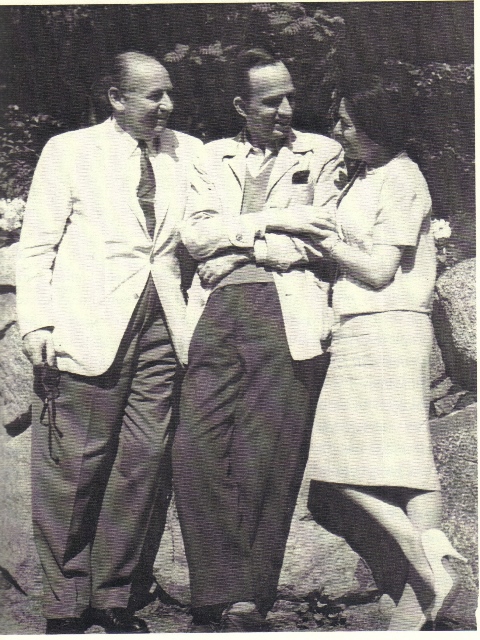
I find that I am not good at writing original stories, the odds against such a story being a good and well told are extremely bad..So I prefer to find a story already written, either as a book or a long magazine article.That way I can see if the dramatic structure works.I usually adapt an existing published novel.I tell the author what I am going to do is“ the equivalent of taking an oxen and reducing to bullion cube“.Then the actors, director, cameraman and the sets/locations will expand the bullion cube back to full size oxen.
The trick is to write a 120 page screenplay of maybe 15 000 words, that conveys the same story as the novel which had 150 000 words.The problem is too few people are willing to read a novel-and if they do, they may not see what you saw in the story that would make a good movie.I like French method where a specialist in dialogue is brought in to improve just the dialogue.
Do the producers have to pay promised money upfront or they just pay invoices which come their way during filming or they pay for everything when the film is made.
Producers don´t invest in film, they don´t have the money.They get money from studios or advance sales to foreign distributors-contract- that they have to show to a bank to get a loan against these contracts and the banks don´t want to take a chance that picture may not get made so their loan is contingent on delivery of the final print to the distributor who has to accept the movie at that which he bought when it was just idea or script.If the finished movie doesn´t have the actors/stars that the producer promised, he can refuse the movie.So the producer has to find interim financing and buy a completion bond from an insurance company that guarantees that the film will be finished regardless of weather problems/delays or problems with the actors or director.This bond is expensive and requires that the producer includes in his budget a ten percent contingency in case he has problems during production-that means that he has to raise/find these additional ten percent dollars even though he doesn´t expect to ever need them.
It is very complicated but the end result is that no producer has enough personal money to finance a film.Usually he does not even take a fee during production because he needs every cent to pay the crew, actors etc.Then if the picture never goes to the profit, he has done all his work for free.I have never seen a penny of „ profit“ from any of my films but I enjoy making them.
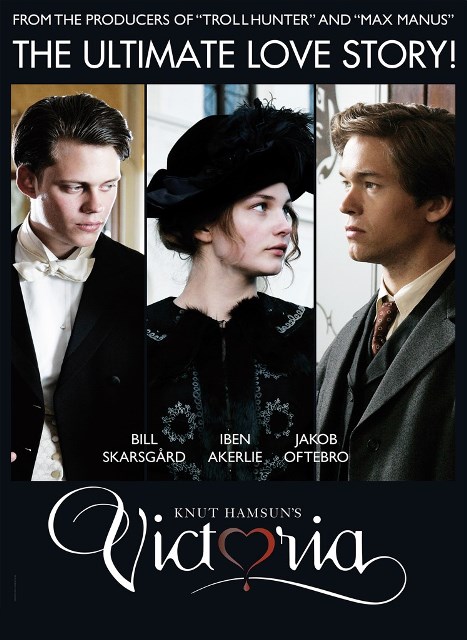 When we read that film made XX dozens of millions in first week of screening, is it a net profit already? How does it work anyway?
When we read that film made XX dozens of millions in first week of screening, is it a net profit already? How does it work anyway?
The numbers announced about a film´s income represent the amount taken in the box office-only half of this at most goes back to the studio/financier and the theatre exhibitors take their time remitting these monies while the interest on the production loan mounts every day.
As a producer, I try to get a film made-to get it financed.And there is never enough money to make a film properly.And with the accounting practices at the studios a picture almost never goes into „ profit“.They always show the loss to the producer even though the studio gets large „ overhead“ fee and charges for everything from pencils to advertising costs.They use a „rolling break even“ there is no fixed point at which a picture goes into profit.As soon as a picture approaches profit where they would have to share monies with the producer and any other profit participants, they spend some more money on advertising/marketing and distribution costs in some part of the world and that moves the break-even figure further in the future.Pictures only go into profit if they are large hits the moment they are released.Remember, they charge interest on each dollar spent from moment it is spent even if the picture is in development for several years.By the time the picture is finished the daily interest on the money spent is huge and it is paid back to the studio first.The producer is lucky if he gets a fee during production just as director or actors are paid.So if you are going to spend several years of your life on a film project it had better be something worthwhile that you believe in.
As long as a film fills sufficient seats in the theatre, the owner( exhibitor) keeps that film showing-unless he has an agreement to start showing film at certain date.The whole game is to fill those seats and sell tickets. Unfortunately, some films don´t have the budget to market, advertise and may need word-of –mouth to let people know there is a worthwhile film at a local cinema-but the film may be booted out before it can find the audience.It is just hard to sell/exhibit a movie at is it to finance and produce.
These days so many sequels are made.Is it just sure financial bet for studios, shortage of good screenplays or topics or studios fear to risk their money in financing interesting project, that have thick and deep idea but probably wouldn´t become a smash hit?
Sequels have the advantage of the pre-sold name-a recognized brand- there is less of a gamble if an audience liked the first film.Even if a screenplay and story is excellent, it is always a gamble that it will translate well to film and find an audience that likes it.
Many people think making films is an exotic and nice job.What is your view at it?
We are all trying to figure out how to get money for film production-the best way is to have a very rich uncle.In the picture business is it said that the best way how to make a small fortune is to start with large fortune.It is very uncertain way of life.Whenever I have filmed on location whether in Colorado or Switzerland, we have hired local people away from their steady jobs in their communities and often they have been seduced by the movies.They quit their jobs(hotel receptionists, waitresses, even local police) and they follow us back to Hollywood to work in the movies.Not a good move.Between films, when my friends and I have been out of work and very pessimistic about ever making another film, we always thought of Chicken farming as a better alternative.But then another film got green light and we were back in business and forgot all about the hard times between films.The film business is everyone´s second business but very few make a living at it and fewer still are able to save money for retirement.On the other hand, it is a lot of fun while you are doing it and my motto has always been „ life is uncertain, eat dessert first“.
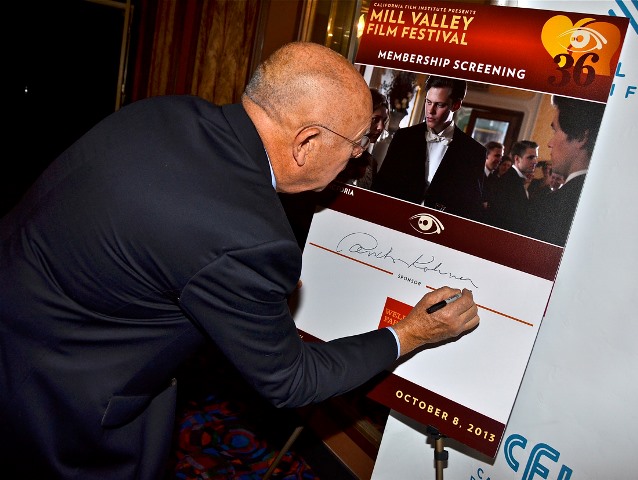 You know actors are happy to get any job no matter if it is independent or a studio film.An actor can work on twelve or more films in a year(unless they are star who is on the set eight or ten weeks).There is so much competition to get acting jobs, hundred if not thousand of would- be- actors get off the bus here in „ Hollywood“ every day, coming from across the country where their acting teacher told them they could be a star because they were good in a school play.Ninety- nine percent go home after a year of supporting themselves as waiters or….?
You know actors are happy to get any job no matter if it is independent or a studio film.An actor can work on twelve or more films in a year(unless they are star who is on the set eight or ten weeks).There is so much competition to get acting jobs, hundred if not thousand of would- be- actors get off the bus here in „ Hollywood“ every day, coming from across the country where their acting teacher told them they could be a star because they were good in a school play.Ninety- nine percent go home after a year of supporting themselves as waiters or….?
Did you have any good and close working relationship with a star actor?
Yes, it was Charles Bronson. He was my close, personal friend.We made together 12 films.He was a client of my father who sent him to Europe to work on some movies.So we used to meet in Italy and Spain where I worked.When I moved back to LA in 1971 I wanted to make a movie about the man who transfers to the tree to escape from boring life with his wife.It was called Mr.Sycamore and I had Jean Simmons who played for free for me. It cost me 50 000 dollars.Charles wanted to play in it under the condition I will show him to become a tree. So I hired Jason Robarts. Charles said to my father that he will buy him a Rolls Royce if he makes him a film star.He kept a word and one day parked a white Royce in front of my father´s office. Today one can´t build any good relationship with stars cos they are filming around the world not just in LA.
We started our interview with issue of getting the money for film. Now the film is made and won an Academy Award.Have you ever been to the ceremony?
I have only gone to Awards ceremony to impress a date when I was much younger and single or when a friend was up for award.A few years ago I went because my nephews, Chris and Paul Weitz were nominated for best screenplay for „ About a boy“.They didn´t win.You have to be dressed in Tux at 2 in the afternoon and once in your seat, if you have to leave to go to the bathroom, there are extras standing at the sides who take your seat so the cameras won´t see an empty seat.It´s much more fun to watch the whole thing on TV with some friends and drinks and be able to laugh and comment on what´s going on.
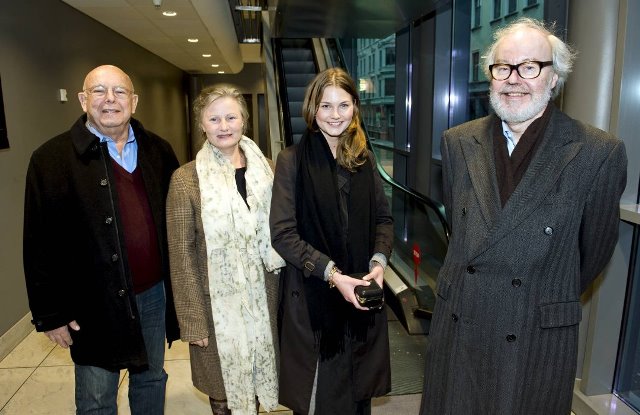 And how about those well known parties?
And how about those well known parties?
They are usually hosted by people who have a big house and want to make some money for charity.I have never been to such party.Everybody who works in production business must get up early in the morning and during weekends they are either with families or read screenplays.Celebrities must got to premiere screening and to pick up awards in order their face would be on screen and everybody in film business knew he/she is still alive and look good.
How do you view independent film?
An independent film does not have studio financing and you are never sure that you will have all of the money to complete the film and to pay all your debts.You´re never sure that check will be good at the bank.And you still have to find a distributor after you´ve finished the film while studio have their own distribution departments.The advantage of an independent film is that you don´t have any interference from the head office.
How you do look at current digital technology?
Making films is such a risky business and you can spend your youth chasing after a film career and suddenly you are middle –age and you have no other skills or prospects.But it is very satisfying when it works and today with digital cameras the cost is a fraction of what it used to be.And, you can practice and hone your skills with digital camera.Many people start out by making a short film and later expand it into a feature film for theatres or TV.


